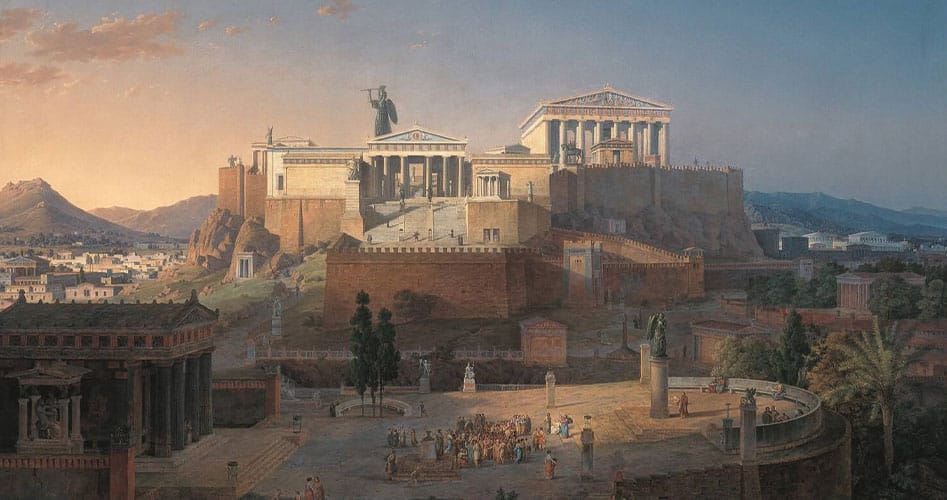Athens: A Cautionary Tale of Democracy’s Failures
Athens today is just another mid-sized European city, capital of one of Europe’s least-developed countries, tucked away in a southwestern corner of the continent far from the modern power centers in Germany, France, and the United Kingdom. But two and a half millennia ago, Athens was, if not the mistress of the world, at least the hegemon of the Mediterranean. The cultural capital of the Aegean, Athens rose to become economically, politically, and culturally dominant among the more than 50 independent city-states that characterized most of classical Greece as a result of two major events: Athens’ reliance on a form of popular government called “democracy,” and her defeat of the supposedly invincible Persian military at the Battle of Marathon in 490 B.C. Athens’ star, though bright, was short-lived, and her decline, ably chronicled by the likes of Thucydides and Xenophon, who both lived during that period, affords many salutary lessons to her modern heirs in the Western world, especially the United States.
Cultural Flowering
Athens was not always the city of philosophers, playwrights, and sculptors of the modern popular imagination. Her exact origins are unknown, but according to legend, she was first propelled to power by the hero Theseus, who enabled the Athenians to shake off the yoke of the superior power of Crete. Those events, if based in fact, took place sometime prior to 1,000 B.C., during the Greek Bronze Age, when Greece, like all other major states of the era, was a monarchy. Following the Bronze Age, however, Greece entered a mysterious dark age of many centuries, during which the Greek world fragmented into many smaller powers, often differing significantly one from another culturally and politically, while being united under a common language. When the curtain rose on the classical age, Greece had become primarily a land of many city-states — Athens, Thebes, Corinth, Megara, Rhodes, and many others — sprinkled across the Aegean islands, the Greek mainland, and western Asia Minor. It was in this last region, called Ionia, that Greece appears to have seen its first major cultural flowering, thanks to pioneering minds such as Thales and Pythagorus. Thales, the “father of science,” was a native of the Ionian city of Miletus, the first Greek center of learning and culture.
But Miletus’s glory came to an end with the rise of the Achaemenid Persian Empire, founded by Cyrus the Great. Cyrus and his son and successor Darius conquered all of Asia Minor, including — despite stiff resistance in some quarters — all of the Ionian Greek city-states. Athens, a close ally of Miletus and other Ionian Greek states, sent continual aid and comfort to them during their struggle against the Persians, encouraging and supplying armed uprisings after Ionia had been incorporated into the Persian Empire, incurring the wrath of Persia. Athens even sent an expeditionary force to Asia Minor that sacked and burned the Persian capital of Sardis. As a result of this affront in particular, the second Persian emperor, Cyrus’s son Darius, resolved to end the pesky Athenian meddling, and assembled a large invasion force tasked with crossing the Aegean and reducing Athens to ruins. The huge armada island-hopped its way toward Athens, overwhelming one Greek settlement after another, before landing on the Greek coast near the broad plain known as Marathon. The Athenians, meanwhile, along with a single ally, the Plataeans, were encamped a few miles away under the leadership of Miltiades, the first great historical Greek military hero.
JBS Member or ShopJBS.org Customer?
Sign in with your ShopJBS.org account username and password or use that login to subscribe.

 Subscribe Now
Subscribe Now
- 24 Issues Per Year
- Digital Edition Access
- Exclusive Subscriber Content
- Audio provided for all articles
- Unlimited access to past issues
- Cancel anytime.
- Renews automatically

 Subscribe Now
Subscribe Now
- 24 Issues Per Year
- Print edition delivery (USA)
*Available Outside USA - Digital Edition Access
- Exclusive Subscriber Content
- Audio provided for all articles
- Unlimited access to past issues
- Cancel anytime.
- Renews automatically


